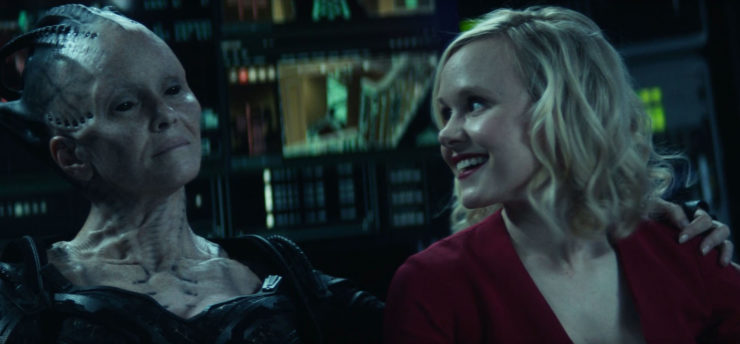The second season of Star Trek: Picard was rife with plot twists, but for my money, the biggest by far was when Agnes Jurati (Allison Pill) stole the entire series from right out below its title character and never gave it back. Picard may be my favourite Star Trek captain; Patrick Stewart may be one of the best living actors; but by the third episode, it was Agnes for whom I was tuning in.
That she was able to pull off this heist is remarkable. Although Allison Pill is an excellent actress, her turn as Jurati made very little impression upon me during the first season; what’s more, she spent the better part of this season paired off with the Borg Queen (played, in this iteration, by Annie Wersching)—a character that I had always found to be an unfortunate, if necessary, plot contrivance to humanize the Borg for casual filmgoers in the 1990s. And yet it worked. During every moment these two were on screen together, the chemistry between them was so overwhelming that it was scarcely possible for me to look away. Their bizarre relationship dynamics—enemies-to-toxic-quasi-lovers-to-enemies-to-the-same-person—were certainly captivating enough, and the resolution to their arc is easily the most interesting thing that Trek has done with the Borg in the last thirty years. But upon reflection, it occurs to me that what most caught my attention about Agnes’s character arc was how it resonated with my own personal experience as a transgender woman.
Now, of course, I have no reason to believe that Agnes, the character, is transgender; that’s not what this essay is about. But I hope that it’s uncontroversial to say that her arc across the second season is a transition narrative: the story of a character who starts out as one thing (a brilliant but neurotic and deeply unhappy human scientist) and ends up as something quite different (the freaking Queen of the Borg). What’s more, it is a story about Agnes coming into her power through a personal transformation that many would consider wrong or even monstrous; about finding where she belongs and becoming who she was (in this case literally) always destined to be. It is, in short, a story about one woman’s self-actualization through transition.
(There’s an obvious objection to this claim: on a textual level, it may be difficult to see how a character who spends fully 30% of the season as a meat puppet for a malicious alien hive queen can be said to be achieving self-actualization. I can definitely see this point, but I’m going to stick a pin in it for now. We’ll come back to it later on.)
So. Agnes Jurati.
Buy the Book


A Prayer for the Crown-Shy
At the top of the season, we find Agnes somewhat worse for the wear than she was at the end of season one. She’s been found not criminally responsible for her Zhat Vash-induced murder of her ex-boyfriend Bruce Maddox, but her relationship with Cristóbal Rios (Santiago Cabrera) has fallen apart due to her inability to maintain interpersonal connections. Much is made of her loneliness: as a cyberneticist, she seems more at home with machines than she is with her fellow humans (as Rios puts it, “Synthetic cats; synthetic people; with them, you’re intimate. Other humans? They’re the problem”). The first time we see her, she’s drinking alone to excess, and she is later heavily implied to be dealing with suicidal ideation. She is, in short, a mess. More than that, she is the exact sort of a mess to which anyone who has ever suffered from social dysphoria can readily relate: the sort you become when you are haunted by the suspicion that you, fundamentally, do not fit amongst those who are supposedly “your people.”
She also has a more-than-strictly-academic fascination with the Borg. This particular trait was demonstrated as early as last season’s “The Impossible Box,” when she evinced an intimate knowledge of the details of Picard’s assimilation and seemed noticeably disappointed to be refused entry onto a derelict Borg Cube, but it really comes to the fore in the early episodes of this season. When a Borg ship (later revealed to be represented by Agnes’s own future self) emerges through a spacetime rift, Jurati’s is the main voice advising that their improbable request to join the Federation be given a fair hearing. When Q whisks them all away to a nightmarish alternate reality in which a fascist regime on Earth has somehow destroyed the Borg Collective, she is noticeably sympathetic to their captive Queen (who, interestingly, finds her just as fascinating). And when La Sirena’s crew take this Borg Queen with them back in time, Agnes enthusiastically volunteers for partial assimilation to access her memories, even over Picard’s objections.
I would like to dwell on this partial assimilation for a moment. First of all, it should be noted that it is only the first of several conscious decisions that Agnes makes that bring her progressively closer to becoming a Borg, each time rationalized with a flimsier excuse. “Letting the Borg Queen enter her mind because she needs to access the Watcher’s location” soon becomes “leaving the Borg Queen active in case she knows anything else,” which in turn becomes “letting the dying Borg Queen inject her with nanoprobes because she needs her to get home” and finally “not telling any of her crewmates that she has a Borg Queen living in her brain because they have a mission to complete.” I’m sure that every soon-to-hatch transgender egg who has ever started buying their target gender’s deodorant “because it smells better” can readily relate to Agnes here, and even the Queen calls her out on it.
But on a deeper level, the partial assimilation is significant because, in effect, it makes the Queen into a figure of Agnes’s own subconscious, rummaging around the “rooms” of her mind and forcing her to acknowledge things that she would rather keep buried: that she wishes Picard were her dad but also thinks that he’s an arrogant prick; that her humour is really just a mirror to hide her insecurity; and that she is overwhelmingly, soul-destroyingly lonely. Here, it is useful to invoke the Jungian concept of the shadow—the darker, hidden side of an individual’s psyche; those emotions, traits, and desires that are considered unacceptable to one’s conscious self and can only be acknowledged in another. Within the subtext of the narrative, the Borg Queen is Agnes’s shadow; at once both frightening and alluring, she embodies Agnes’s forbidden desires. The season’s visual language plays this to the absolute hilt as well, repeatedly framing Agnes in the foreground with the Queen in background, and contrasting their respective light and dark pallets. The downed La Sirena thus becomes a sort of a microcosm for Agnes’s own psyche, with her shadow literally bound-up at the back but ever demanding of attention, promising a transition that Agnes knows that it’s unacceptable to want, but which she wants nonetheless.

It is noteworthy that, when Agnes finally does give-in to the Borg Queen at the end of “Fly Me to the Moon,” the immediate effect is a breakdown in her inhibitions. Formerly shy and somewhat mousey, Agnes finds herself surging with confidence, kissing Rios (albeit with the Borg Queen forcing the matter) and singing on stage. Interestingly, this new confidence corresponds not only to a change in pronoun (in this case, from I to we), but also to a marked change in gender expression. For most of the season and a half leading up to her injection with nanoprobes, Agnes had tended to wear conservative, unisex garments in tones of white or light blue. Here, though, she sports a blood-red cocktail dress with a plunging neckline (matching that of the Borg Queen’s own garment). For Agnes, confidence—and, indeed, euphoria—come with adopting a much more gendered style.
The euphoria is an interesting element here, because, as a part of the assimilation process, it appears completely novel to this season of Picard. Throughout the history of the Star Trek franchise, Borg assimilation has been almost exclusively portrayed as horrific: a violation of the body and an enslavement of the will. Even the one previous episode to take a more positive view of the subject, Voyager’s “Unity,” only really emphasized the potential benefits of a collective consciousness. But here, assimilation feels good—at least for Jurati. In fact, not only does it feel good, but endorphins catalyze the process; the happier Agnes feels, the more control that the Queen has over her—confidence giving way to rampaging id.
Feelings of euphoria are also a part of the transition process for many transgender people, particularly during the early stages. There is a joy in letting go of one’s inhibitions; of embracing truths about oneself and one’s desires that one has for so long denied. But embracing these truths can also be a process of negotiation of boundaries with oneself. When you’re building a new identity, it is very important to be cognizant of what you are comfortable with becoming, and above all, who, exactly, you want to be.
Agnes’s arc comes to a close with exactly such a negotiation. To the series’ credit—and somewhat to my surprise—she is never decoupled from the Borg Queen; her transition is the new status quo for her character. But she also does not surrender to her shadow: she refuses to simply become what the Borg Queen wants her to be. Instead, she assimilates the Queen just as surely as the Queen assimilated her, and together they forge a new identity, taking the best parts of each: the Borg Queen’s strength, confidence, and collective nature tempered with Agnes Jurati’s wisdom, compassion, and humanist ethic. Even better, Agnes—or, rather, the being that she’s become—finds belonging and a sense of purpose in her new identity by travelling the Galaxy to help those like herself: not by indiscriminately assimilating everyone she can, but by offering the benefits of a collective to those who really, truly want it. One might even liken this to transgender community building.

At the end of the season, we get to see Agnes Jurati one last time, four hundred years in her subjective future. She’s pale and ashen and eldritch and generally weird-looking. And yet, for me at least, it was honestly one of the most heartwarming moments of the entire season. Because what she looked like was herself: what she had always wanted to be; what she was always meant to be. More than that, even though she’d been Borg for ten times longer than she had ever been human, the essence of what she had once been was still with her: the only difference was that now, she seemed genuinely content. Not euphoric; not putting up a bubbly façade to mask her sadness; but simply satisfied with herself and with her place in the Universe.
Whatever else can be said for this season, I am grateful to the writers for allowing Agnes to have this strange and beautiful fate.
Jaime Babb is a writer, editor, and lapsed physicist currently living in Montreal. She can be followed on Tumblr at quasi-normalcy.tumblr.com.










